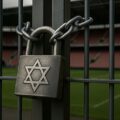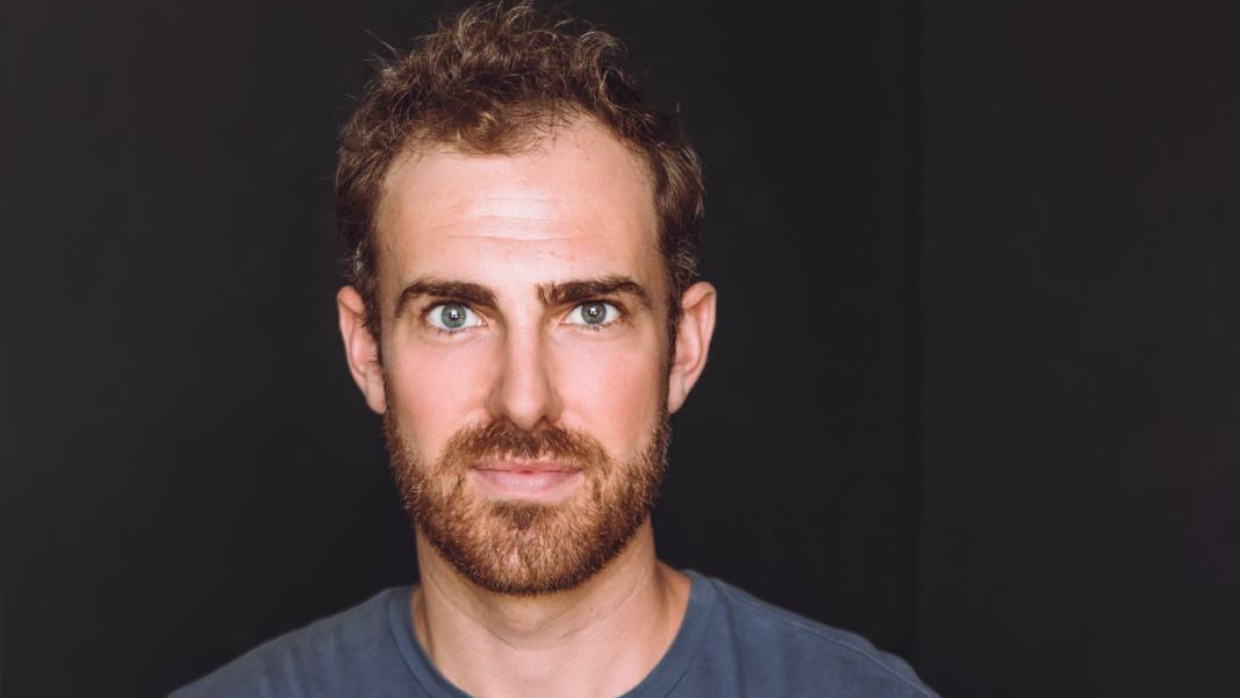 No Jews Allowed—Again
No Jews Allowed—Again


9 min read
Grieving over the death of his wife, Rob Mor, an award-winning filmmaker, is giving hope to widows of October 7.
Born in Honolulu, Hawaii, Rob Mor was two years old when his parents split up and moved to Chicago with his mother. When he was ten, his mom remarried an Israeli man who adopted Rob. “I practically became Israeli overnight. I suddenly had Israeli siblings and cousins,” Rob said in an Aish.com interview. Rob felt a sense of Jewish pride and a strong connection to Israel.
As a young adult, Rob pursued a career in filmmaking and acting in Los Angeles, where he met Noel. They were both 23.
“I know this sounds weird, but the first time we met was at a party and I pretended to be blind. I thought it would be funny. I was sitting on the sofa, wearing sunglasses, pretending to be blind. Her boyfriend at the time even helped walk me to the bathroom. They totally bought it.”
Rob kept it up for 40 minutes before he finally told them the truth. “Noel thought the joke was offensive and was completely turned off by it. Of course, she was right. I was just being a stupid, 23-year-old guy. But for me, it was love at first sight.”
Three months later Noel broke up with her boyfriend. She inquired if Rob had any single friends.
In fact, I do, Rob thought. He pursued her and was smitten. “Two months later we were dating seriously. We were married by 26.”
Three years into their marriage, they welcomed a beautiful baby girl named Leia.
 Noel and Rob Mor, and their daughter Leia, before her death in 2019
Noel and Rob Mor, and their daughter Leia, before her death in 2019
Noel experienced postpartum bleeding and went to the doctor. They found a small cyst that was about three centimeters in size. Noel wasn’t concerned. “Oh, I’ve always had cysts, it’s nothing,” she had insisted.
When Leia was four months old, Noel went to a Soul Cycle class. “She was usually really fit and able to crush it, but something didn’t feel right. She was in a lot of discomfort.”
There were other signs it could be cancer but Noel kept assuming they were more postpartum symptoms. “The day after her Soul Cycle class she woke up and said, ‘Something’s not right.’ She called me and had me come home from work.” They went to the doctor and did emergency imaging. They thought she might be carrying an ectopic pregnancy.
“Forty-eight hours later we were sitting in the oncologist office and the surgeon told us it was ovarian cancer.”
The original prognosis was very positive. Noel would just need surgery and chemotherapy, and would be okay.
“Hearing the C word is scary. Our lives changed drastically at that moment. I could never have anticipated what was about to happen.”
Noel passed away when Leia was only two years old.

Today, Leia is seven and Rob attributes much of his healing to her. “My daughter saved my life—there is no way I would be alive right now without her. Because of her, I have something bigger than myself to live for. If not for Leia, I would have gone off the rails pretty hard.”
For a while, Rob actually did go off the rails. “I was dating a ton of people and trying to fill this void. I was feeling the worst pain imaginable and just thinking I need to fix this.”
Rob eventually realized the need to surrender to the reality that this special person is no longer here. He also found it helpful to surrender to a higher power.

After Noel passed, Rob moved to Pasadena to live within walking distance of his in-laws who help him co-parent. His parents also serve as multifaceted support system as well.
Today, Rob is thrilled with how Leia is growing up. Her well-being serves as a barometer for how Rob is doing in his life.
It has been several years since her death and Rob still fights the grief. “There is an outpouring of emotions, good, bad, and ugly that come when faced with death.”
After the horrific events of October 7th, Rob became obsessed with checking the news for the status of the hostages. He couldn’t fathom the tragedy and kept thinking about all those that had lost their loved ones. He decided to join a solidarity trip with his Rabbi to Israel.
He brought his camera along, hoping to film stories of individuals. Rob owns a production company and had recently produced a film called Ghosted which had been well received. Dan Luxenberg of Rovia Media, called him and said, “You’re going to Israel. I have some access to widows who lost their husbands. Would you be interested in interviewing them?”
Rob wanted to meet them, to bring hope and encouragement, and possibly help them see that there is a glimpse of light at the end of this dark tunnel called grief. He wanted to show them that life can and will eventually get better after the death of a spouse.
Being a widower, Rob had a different perspective than other filmmakers. When he got to Israel, his project morphed into a full-blown documentary. Rob was put in touch with orphans, parents whose children were murdered at the Nova festival, and parents of children who lost a spouse. He rented a second camera and got to work.
When he interviewed the CEO of IDF Widows and Orphans organization, Rob learned that Judaism’s definition of an orphan includes if one parent had passed. It dawned on him that his own daughter was considered an orphan by Jewish tradition.

One man explained that parents are like pillars, holding up the structure of a family. He said, “When one of the pillars is gone, the other becomes damaged, trying to hold up the structure. These families need the community. They need to feel that they are not alone.”
Rob recognizes that death from cancer is different than being murdered by a terrorist group, but he feels that the grieving process has many similarities. Firstly, grieving can’t begin until the person is determined to be dead.
Rob noted that the families of the hostages are living in this world of uncertainty and limbo, and are in constant survival mode. “I was also in survival mode for two years, until Noel died at the age of 31. The grieving doesn’t really start until the person passes, and only then it really becomes real. It’s an intense, long process. The families of the hostages are stuck in the middle of life and death. They have no closure, and hope is waning.”
Despite the horrors of what the survivors have gone through, he sees their formidable strength and resilience.
“When I see the strength of the survivors, I think about my wife fighting for her life. She went through chemo and surgery, and in her last year of life she had two good days a month and the rest were bedridden. But she continued to fight. She kept going, and she was doing it for Leia.”
Rob noticed that those who are bereaved have to find reasons to live that are bigger than themselves. “You have to make a decision to live for your children, your family, or our country. Sitting down with the widows, I could feel them saying, ‘I’m here for my kids.’”
Rob found that talking about their loved one helps the healing process. He also discovered that the widows most appreciated being remembered by others and invited, feeling like they still belong in the community. Any gift or kind gesture is thoughtful.
“Grief is complex and I am happy I was able to give an ounce of hope to those who are bereaved.”
Rob ended up creating a deeply moving 73-minute documentary titled Echoes of Loss: Eight Days in Israel, sharing the personal stories of a number of Israelis who suffered unimaginable loss on Oct 7. Rob also highlighted the plight of the Jewish people. “There has been a dehumanization of Israelis, and I wanted to correct this misconception.” Rob explained. “When I lost my wife and I felt utterly alone, there was a tremendous outpouring of empathy from so many people worldwide. After October 7th, there are so many individuals and families that have been broken from the attacks, and instead of receiving empathy they are facing more hatred from their surrounding world.”

One man named Eliot whose brother, a lone soldier in the IDF, was killed in battle. While his family and friends were burying his brother, Hamas rockets began flying over the burial grounds. “Here is a guy who still hasn’t processed the death of his brother and he is now being attacked while burying him?”
Rob also sees the need to speak up and take a stand. “After October 7th, initially I was silent because I feared losing friends and followers. Now, I’m not afraid because the truth has to be shared. We have to stand up for what we believe in. Israel has the right to defend itself.”
For Rob, the film is his way to help the Jewish people. “I was at an army base and this IDF soldier pointed to his gun and said, ‘This is my weapon, and your camera is your weapon.’ I will not be on the side of silence.”
Rob went into this project wanting to give hope to others and help heal himself, but it became something so much larger. “The bereaved feel responsible to share the story of their loved ones. It’s a way of honoring their child or lost spouse. They often said, ‘I need to share the story. I need to be strong enough to get through this sentence.’”
A voice with no echo dies. Those who have passed will live on as long as we continue to share their story. It’s our job to keep sharing.

Thank you for sharing your grief.
Thanks! Having worked as a case manager/counselor - for military veterans. As this kind of sharing helped the veterans. Seeing an article like this helps - for those of us - that have been there - done that & not feel so alone. For me - it's been 2X. At 20 years old - my first wife had an operation - only the surgical staff made a mistake. We had a 2-/12 month old daughter. I asked G-D for some help - as I was devastated & wanted someone to help me raise her. He sent my second wife - who knew the day we met - she would marry me. I carried a lot of untreated spiritual/mental baggage from the first loss. My second wife - died 48 months ago - from a stroke - after 55 years of marriage. I had only recently begun to shed the baggage. Now - I wonder - what's in my future?
That's exactly it. Each of us has to use our "weapon" (talents / tools of influence).
I wrote a collection of stories to support Jewish orphans ages 8-13. It's called Invisible Tribe and should be out in September. Next I'm hoping to get it translated into Hebrew - to give out to Israeli orphans. How I wish his film and my book weren't needed...
When will this be available to see and perhaps share with our communities?
I was very moved by the story, it brought me to tears. I’m so grateful that there are people like this man in the world, sharing their experience strength, and hope with others.
Well-written. I was married for seven months when my first husband died if complications from surgery. Been happily married to my second husband 44 years now. I am glad you are doing this project. May it be a huge success and help many people in their grieving process